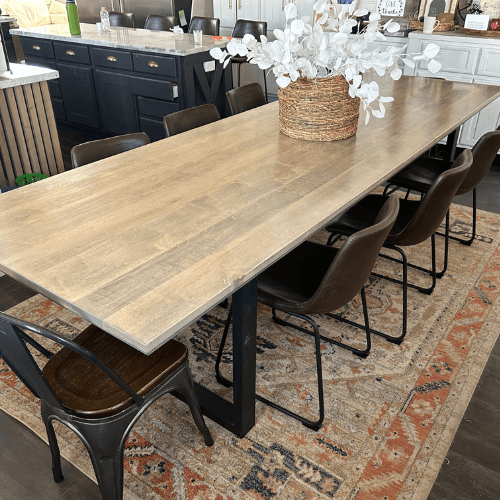When it comes to furnishing your home, the type of dining table you choose can make all the difference. While there are many options available, including mass-produced tables, a custom wood table offers unique advantages that set it apart. In this post, we’ll explore the differences between a custom wood table and a mass-produced table and why you might want to consider investing in a custom design for your Rexburg dining table.
The first and most obvious difference between a custom wood table and a mass-produced table is the level of customization available. A mass-produced table is typically designed with a general consumer in mind and is not tailored to meet specific individual needs or preferences. On the other hand, a custom wood table is made to order, which means you can work with a skilled woodworker to create a table that meets your unique style and functional requirements. From the wood species and table shape to the finish and design elements, you have complete control over the look and feel of your custom wood table.
In addition to customization, another key difference between a custom wood table and a mass-produced table is the quality of the materials used. Mass-produced tables are often made with lower-grade wood or particleboard, which can be susceptible to scratches, dents, and other types of damage. In contrast, a custom wood table is built using high-quality wood that is often thicker, more durable, and better resistant to wear and tear. This means that your custom wood table will not only look great, but it will also last for many years without needing repairs or replacements.
Craftsmanship is another factor that sets custom wood tables apart from mass-produced tables. Custom wood tables are handcrafted by skilled woodworkers who take pride in their work and pay close attention to every detail. They use traditional woodworking techniques and tools to ensure that each piece is crafted with precision and care. In contrast, mass-produced tables are often assembled on a production line, which means that the attention to detail and quality control may be lacking. This can result in tables that have wobbly legs, uneven finishes, or other imperfections that detract from the overall aesthetic and functionality of the piece.
Another important consideration is the environmental impact of your dining table. Mass-produced tables are often made using materials and manufacturing processes that can be harmful to the environment. For example, they may be made using cheap materials that are not sustainably sourced, or they may be produced in factories that emit large amounts of carbon dioxide and other pollutants. Custom wood tables, on the other hand, are often made using locally sourced, sustainably harvested wood and traditional manufacturing methods that have a smaller environmental footprint. This means that investing in a custom wood table is not only good for your home but also good for the planet.
Lastly, the value that a custom wood table brings to your home is worth considering. While a mass-produced table may seem like a more affordable option, it may not offer the same level of value as a custom wood table. A custom wood table is a unique piece of furniture that is made to last for many years, even generations. It can also be a great investment that adds value to your home and enhances its overall appeal.
In conclusion, there are many differences between a custom wood table and a mass-produced table, and it’s important to weigh the pros and cons before making a decision. A custom wood table offers unique advantages in terms of customization, quality of materials, craftsmanship, environmental impact, and value. If you’re looking for a dining table that will stand the test of time and be a stunning centerpiece in your home, a Rexburg dining table may be the perfect choice for you.
If you’re ready for that custom furniture piece, call us today! Fox in The Sawdust.

